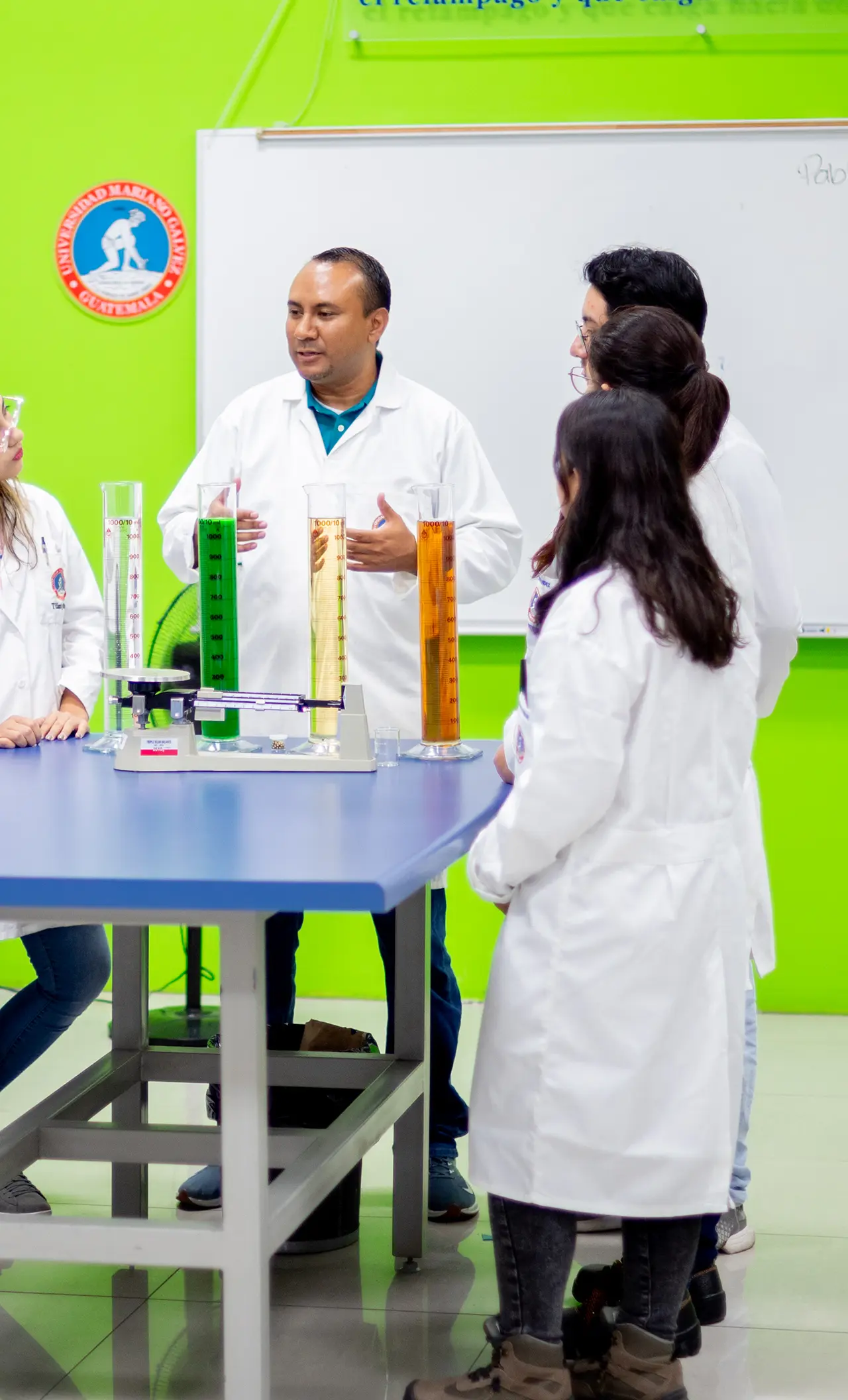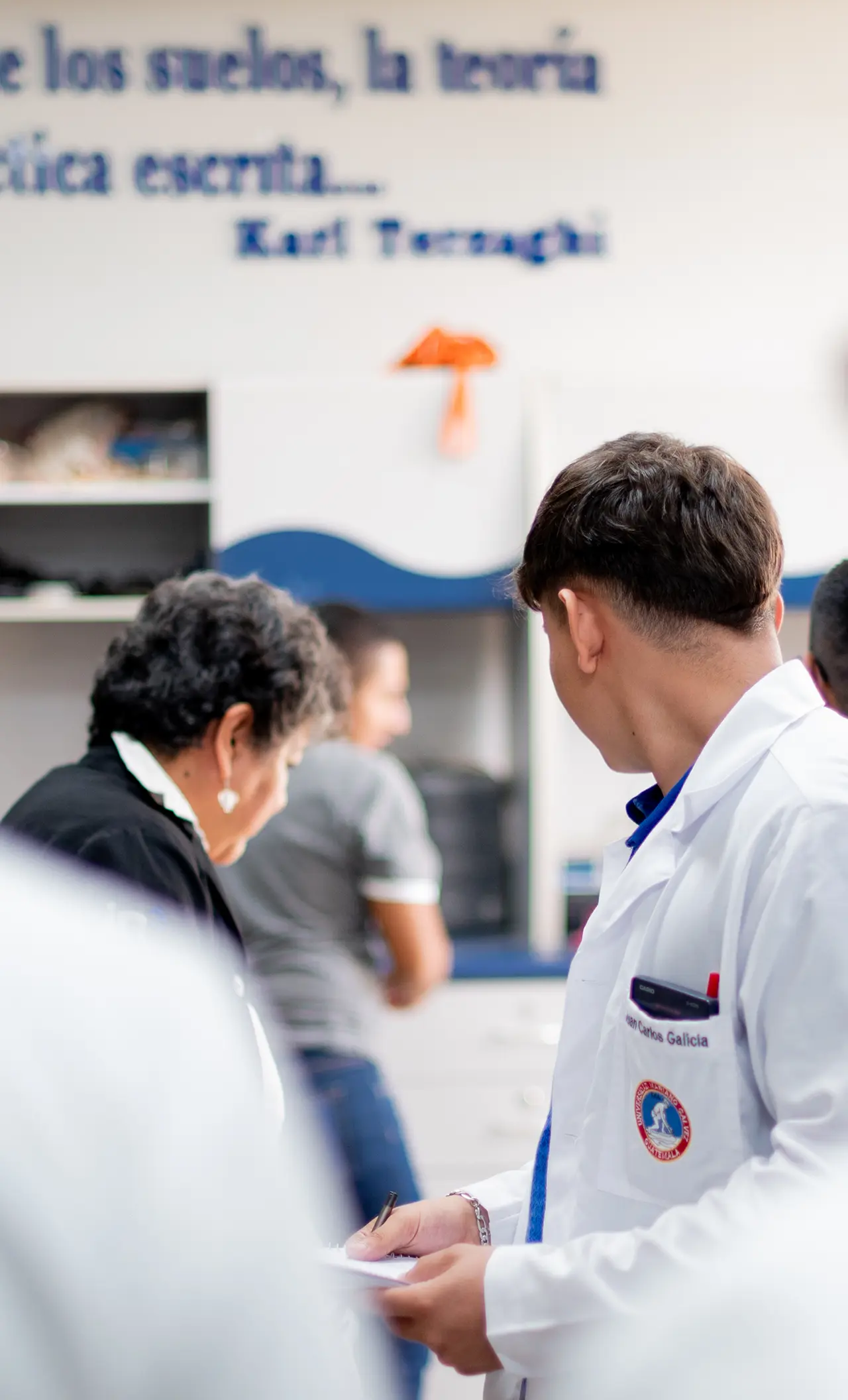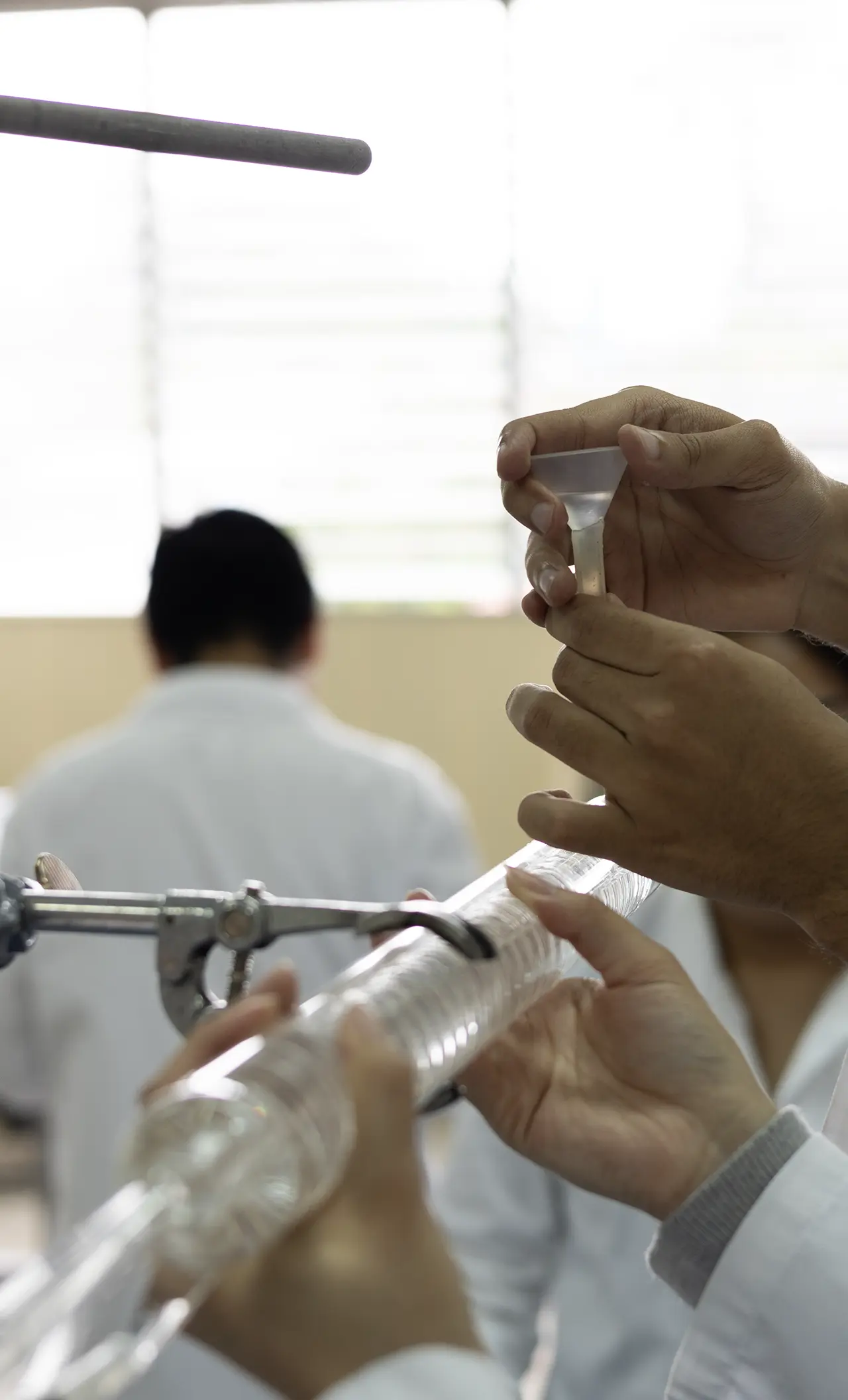
- Bachelor's Degree in
- Chemical Engineering
- Degree to be obtained
- Bachelor's Degree in Chemical Engineering
- Academic degree
- Bachelor's Degree
- Duration
- 5 years
- Modality
- In-person
- Schedule:
- Daily Morning and afternoon sessions
- Career description
-
Chemical Engineering is the discipline of Engineering dedicated to the study, synthesis, development, design, operation and optimization of all those industrial processes that produce physical, chemical and/or biochemical changes in materials. It focuses on the study of the fundamental principles of chemistry and engineering, in order to design, develop and optimize industrial chemical processes. Students at Mariano Galvez University acquire knowledge in areas such as thermodynamics, mass and heat transfer, chemical kinetics, unit operations, process control, etc . They also focus on environmental management, materials handling and optimization of different production processes. Guatemala has different types of industries, among which we can mention the food and beverage, petroleum and hydrocarbon, textile, pharmaceutical and cosmetic, cleaning products, paints, construction, plastics and polymers, water treatment, packaging, accumulators, consulting companies, research centers, among
- What will you learn during the program?
-
Over the course of your Chemical Engineering degree, you will acquire a solid background in a variety of disciplines ranging from chemistry and physics to engineering and management. Throughout your studies, you will explore fundamental concepts such as thermodynamics, chemical kinetics, heat and mass transfer, as well as the operation and design of chemical equipment and processes. In addition, you will immerse yourself in topics such as organic and inorganic chemistry, chemical reaction engineering, industrial plant design, environmental management, process safety and operations optimization. As you progress, you will have the opportunity to apply your knowledge in practical and experimental projects, allowing you to solve complex problems in the field of chemical engineering. These skills will prepare you for challenges in industry, where you will be able to design efficient processes, develop innovative products, ensure safe and sustainable operations and contribute to the advancement of chemical technology.
Gallery
AdmissionProfile
To be admitted to the School of Chemical Engineering, it is necessary for each applicant to have completed, preferably, a diversified program that has provided a solid foundation in mathematics, physics and chemistry. In addition, it is essential that the student demonstrates the ability to analyze information accurately, apply specific knowledge, and communicate ideas effectively both orally and in writing. Optimal development of logical-mathematical thinking and outstanding analytical skills are essential, as these skills are fundamental to informed decision making in the field of chemical engineering. The applicant must also be able to collaborate in teams, exhibit integrity by being honest and respectful, and punctual in all activities. Additionally, the applicant is expected to have a positive attitude towards challenges and exhibit entrepreneurial traits. These attributes are valuable in addressing complex problems in chemical engineering and taking advantage of innovative opportunities in the field.
Graduate'sProfile
The Chemical Engineer graduated from Universidad Mariano Gálvez de Guatemala will be characterized by his solid preparation in the fields of specialization of the career, as well as by his marked social conscience and deep respect for biodiversity. This professional will be an active promoter of sustainable development in a global and interdisciplinary environment, incorporating in their practice the essential values and principles promoted by Universidad Mariano Gálvez. Throughout his or her training, the graduate will have had the opportunity to acquire an enriched experience with a greater dedication to practice. This includes exposure to a wide range of sophisticated and updated tools and equipment, in line with the demands of leading companies both locally and internationally. The resulting professional will stand out for his or her high competitiveness at the national and international level. They will have internalized a culture of excellence and self-learning, which will allow them to remain at the forefront in a constantly evolving field. They will be adept at collaborating in multidisciplinary teams, contributing to the development of innovative processes, optimization of procedures and their supervision. A primary focus will be the efficient use of resources with a view to transforming them into high-quality products, with environmental sustainability considerations in mind. This commitment to ecological responsibility will motivate it to design solutions that are environmentally friendly, thus encouraging more responsible and conscious production.
Career Opportunities

A Chemical Engineer can play roles in a wide variety of industries and sectors, due to their background in applying chemical and engineering principles to solve problems and optimize processes. Some of the areas where a chemical engineer may work include:
* Chemical industry: plastics industry, industrial chemicals, cleaning products, agrochemical industry, etc.
* Oil and gas
* Food and beverages
* Pharmaceuticals and biotechnology
* Energy and environment
* Manufacturing and materials
* Automotive industry
* Electronics and technology
* Environmental sector
* Consulting
* Research and development
* Quality and safety management
Curriculum
| 1° Ciclo | ÁLGEBRA SUPERIOR | DESARROLLO HUMANO Y PROFESIONAL | GEOMETRÍA PLANA Y DEL ESPACIO | PROGRAMACIÓN PARA LA CIENCIA E INGENIERÍA I | QUÍMICA INORGÁNICA I | |
|---|---|---|---|---|---|---|
| 2° Ciclo | ÁLGEBRA LINEAL I | CÁLCULO I | HISTORIA Y COMUNICACIÓN CIENTÍFICA | INTRODUCCIÓN A LAS CIENCIAS DE LA VIDA | PROGRAMACIÓN PARA LA CIENCIA E INGENIERÍA II | QUÍMICA INORGÁNICA II |
| 3° Ciclo | ANÁLISIS QUÍMICO I | CÁLCULO II | CONTABILIDAD PARA INGENIEROS I | DIBUJO ASISTIDO POR COMPUTADORA | FÍSICA I | QUÍMICA ORGÁNICA I |
| 4° Ciclo | ANÁLISIS QUÍMICO II | BALANCE DE MASA Y ENERGÍA | CÁLCULO VECTORIAL Y MULTIVARIABLE | ESTADÍSTICA Y PROBABILIDAD PARA LA CIENCIA E INGENIERÍA | FÍSICA II | QUÍMICA ORGÁNICA II |
| 5° Ciclo | BIOQUÍMICA | CONTROL INDUSTRIAL DE LA CALIDAD | ECUACIONES DIFERENCIALES ORDINARIAS | ESTADÍSTICA INFERENCIAL | FÍSICA III | TERMODINÁMICA I |
| 6° Ciclo | CONTABILIDAD DE COSTOS PARA INGENIEROS | ECUACIONES DIFERENCIALES PARCIALES | FISICOQUÍMICA | LEGISLACIÓN PARA INGENIEROS | MECÁNICA DE FLUIDOS I | TRANSFERENCIA DE CALOR |
| 7° Ciclo | ANÁLISIS NUMÉRICO | CIENCIAS DE LOS MATERIALES | ECOLOGÍA Y SOSTENIBILIDAD AMBIENTAL | INGENIERÍA ECONÓMICA | MANEJO DE SÓLIDOS | TERMODINÁMICA QUÍMICA |
| 8° Ciclo | DISEÑO DE PLANTAS INDUSTRIALES | DISEÑO Y SELECCIÓN DE EQUIPOS | INGENIERÍA ELÉCTRICA I | MICROBIOLOGÍA INDUSTRIAL | TRANSFERENCIA DE MASA I | |
| 9° Ciclo | CINÉTICA QUÍMICA Y REACTORES | INGENIERÍA AMBIENTAL | OPERACIONES UNITARIAS I | QUÍMICA DE ALIMENTOS | TRANSFERENCIA DE MASA II | |
| 10° Ciclo | EMPRENDIMIENTO, INNOVACIÓN Y PROYECTOS | INGENIERÍA DE PROYECTOS | OPERACIONES UNITARIAS II | PROCESOS QUÍMICOS INDUSTRIALES | TECNOLOGÍA DE ALIMENTOS |


